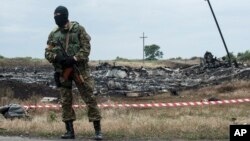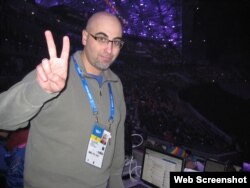There’s a fascinating debate among two Russians playing out on my Facebook newsfeed.
It all started when I posted a news item from our sister broadcaster RFE/RL: “Ukraine Separatist Social Media Site Claims Plane Downing.”
It was a fairly straight-forward account of a post on separatist leader Igor Girkin’s VK page, claiming to have “just downed a plane” somewhere near Torez, Ukraine. His post was later removed amid conflicting claims of its authenticity.
As Facebook posts go, this one seemed fairly innocuous, and only a few friends left comments.
But among them were two Russian friends, Alex and Slava. They not only commented, but began posting stories themselves – stories with wildly clashing perspectives on what downed Malaysian Airlines flight MH17 and who was to blame.
While the governments of Russia and those in several Western nations trade barbs and accusations, the debates are heatedly playing out on social media as well, where individuals seem quicker to reach conclusions than the evidence may allow.
Moreover, in talking with those who see things very differently, a possible pattern emerges of the very different ways people in different nations see and interpret news and information.
'It is not an accident'
Alex Martynov is a proud Russian.
The 29-year-old Rostov-on-Don native has traveled across his country and around the world, making friends at every stop – this reporter included. He speaks several languages, volunteered at the recent Sochi Olympics, and was a loyal VOA listener for years.
“It was evening here when I learn about the tragedy,” he told me via email. “My Moscow friend sent me a message through one of social network that a plane crashed in Ukraine.”
At first, he thought she was talking about the downing of a Ukrainian military plane shot out of the sky a few days earlier by pro-Russian separatists – a phrase that irks Alex.
“Actually, I don't like that people in the West call those people as ‘pro-Russian’,” he wrote. “Those are people who are fighting for their independence. They want to have their own state not included into Ukraine. It reminds me of the early Americans who fought for their independence in the 18th century.”
Alex said he spent the rest of the day glued to the TV to learn about the crash that occurred less than 150 kilometers from his home.
“I said to myself: ‘It is not an accident. It was done by somebody,'" he said. "I also thought it was the Ukrainian Army. There was a similar act by the Ukrainian Army over the Black sea 13 years ago. They shot down a passenger plane flying from Tel Aviv to Novosibirsk.”
Quickly, Alex’s understanding of what happened began to coalesce along the lines of what much of Russian television was first reporting: that the missile was likely fired by the Ukrainian army, and even that a possible target may have been Russian President Vladimir Putin, who was traveling on state business.
Alex is a newshound, and watches a lot of TV news; mostly Russian. “Channel One, Russia 1, Russia 24, NTV, RT (Russia Today)”, he lists.
“I live pretty close to the site of tragedy, and we have many refugees from Ukraine here," he said via email. "They say the things which are said on Russian TV channels, so that is why I trust the TV channels of Russia.
"There was a documentary about the Ukrainian refugees on RT. It was terrible to hear what the people were saying about what happened in Ukraine during the military operations of the Ukrainian Army," he said. "The Ukrainian Army soldiers killed people for nothing, without any reason. It is like Nazi soldiers did 70 years ago.”
Alex uses the Internet as well, but more to see what other non-Russian media are saying. And generally speaking, he doesn’t like a lot of what those other media are saying.
“I am very surprised that many governments claim Russia…shot down the plane. I do not want to name those TV and Radio channels, but I think there is an information war against Russia in the West especially,” he said.
“Their credibility is virtually nil.”
Slava Malamud was born on the opposite side of Ukraine as Alex, in the town of Bender in what was then the Moldavian Soviet Socialist Republic.
A Soviet passport holder, the 39-year-old Malamud lived in Russia and still works as a correspondent for the Russian-based Sport Express media group, although currently he lives in Maryland.
On Facebook, Slava rarely shies away from sharing pungent, if humorous opinions.
“I generally think that in cases of disasters such as this one, the simplest explanation that fits most of the known facts is usually the truthful one,” he told me via email.
“In other words, I tend to vehemently disbelieve any and all conspiracy theories until substantial proof of a conspiracy has been presented," he said. "As such, I am currently convinced that all of the versions which involve convoluted nefarious plots are false.”
Although his opinions, like those of Alex, aren’t set in concrete, at this point Slava has reached a very different conclusion.
“While I do not discount the possibility that the shot may have been fired by the Ukrainian forces, common sense and the available information point to the pro-Russian fighters as the more likely suspects,” he wrote.
That doesn’t mean he thinks the rebels intentionally targeted a civilian plane.
Rather, he said they mistakenly targeted what they likely thought was a Ukrainian military plane of some sort, and took a shot – much as they have previously done.
“Moreover, as their social media activity seems to indicate, the rebels were sure they shot down a Ukrainian aircraft minutes after the crash,” he wrote. “Prior to the crash, the separatists were also publicly bragging about having the Buk missiles capable of shooting down aircraft flying at the heights of 10,000 meters.”
For Slava, the Internet and social media are indispensable in trying to learn the facts of what actually happened.
“Twitter and Facebook accounts provide a lot of information, to say nothing of opinion, and every bit of news is thoroughly chewed and digested in every possible way," he said. "Of course, in this day and age, there is always a risk of running across a fabricated story or 10.”
As for TV, while numerous Russian channels are available on cable or online at his current home, he holds them in much lower regard.
“At this point, their credibility is virtually nil,” he wrote.
“Almost anything put out by Russia's state-owned mass media, especially its main TV channels, is completely politicized and whitewashed to present the ‘patriotic position’, and this concerns not only the Boeing crisis specifically, but their coverage of the Ukrainian conflict from its very beginning," he said.
"Days before the crash Russia's Channel One aired a widely debunked and horribly unprofessional story about Ukrainian soldiers' publicly executing a three-year-old boy by crucifixion in the city of Slovyansk," he added. "The obviously concocted version of the plane crash as an attempt on Putin's life was also a product of the official Russian media.”
'Living in a parallel universe'
It’s probably true that Alex and Slava are more alike than different. Both are smart, curious, appropriately skeptical…and both love hockey.
They both say they would reconsider their opinions if the eventual forensic report reaches a different conclusion than what they now hold, but only with caveats.
For the moment, they’re living in something like parallel universes, not just holding different opinions but citing different sets of facts and consuming different media.
On Facebook, they’re not arguing with each other so much as talking past one another.
That’s exactly what happened recently when CNN’s Chris Cuomo hosted a live segment with RT anchor Peter Lavelle.
It took a mere :50 seconds for one anchor to refer to the other as “ludicrous”. In a matter of minutes the interview was completely out of control, with each anchor talking over the other amid claims of character assassination and stupid questions.
“You’re living in a parallel universe!” decried Lavelle. “You are obsessed with clearing Russia of culpability,” Cuomo retorted shortly after.
The Russian military held a press conference to claim it detected a Ukrainian fighter jet tracking flight MH17 before it crashed.
A day later, U.S. intelligence agencies released photographs, voiceprints and other evidence it says proves that the Russian military was complicit in the attack.
Neither side references the other’s claims of proof in presenting their own.
News of the downing of flight MH17 began with a tweet at 8:36 a.m. on July 17 from Malaysian Airlines, saying that they have “lost contact” with the plane.
In the first crucial hours, social media provided the first nuggets of information, which in turn were picked up by traditional broadcasters.
But those first conflicting digital clues also created the justification for people like Alex and Slava to form their opinions within hours.
And once formed, opinions can prove resistant to change.











